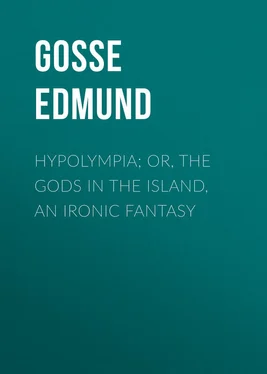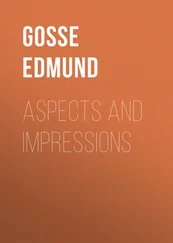Edmund Gosse - Hypolympia; Or, The Gods in the Island, an Ironic Fantasy
Здесь есть возможность читать онлайн «Edmund Gosse - Hypolympia; Or, The Gods in the Island, an Ironic Fantasy» — ознакомительный отрывок электронной книги совершенно бесплатно, а после прочтения отрывка купить полную версию. В некоторых случаях можно слушать аудио, скачать через торрент в формате fb2 и присутствует краткое содержание. Жанр: foreign_antique, foreign_prose, foreign_dramaturgy, на английском языке. Описание произведения, (предисловие) а так же отзывы посетителей доступны на портале библиотеки ЛибКат.
- Название:Hypolympia; Or, The Gods in the Island, an Ironic Fantasy
- Автор:
- Жанр:
- Год:неизвестен
- ISBN:нет данных
- Рейтинг книги:3 / 5. Голосов: 1
-
Избранное:Добавить в избранное
- Отзывы:
-
Ваша оценка:
- 60
- 1
- 2
- 3
- 4
- 5
Hypolympia; Or, The Gods in the Island, an Ironic Fantasy: краткое содержание, описание и аннотация
Предлагаем к чтению аннотацию, описание, краткое содержание или предисловие (зависит от того, что написал сам автор книги «Hypolympia; Or, The Gods in the Island, an Ironic Fantasy»). Если вы не нашли необходимую информацию о книге — напишите в комментариях, мы постараемся отыскать её.
Hypolympia; Or, The Gods in the Island, an Ironic Fantasy — читать онлайн ознакомительный отрывок
Ниже представлен текст книги, разбитый по страницам. Система сохранения места последней прочитанной страницы, позволяет с удобством читать онлайн бесплатно книгу «Hypolympia; Or, The Gods in the Island, an Ironic Fantasy», без необходимости каждый раз заново искать на чём Вы остановились. Поставьте закладку, и сможете в любой момент перейти на страницу, на которой закончили чтение.
Интервал:
Закладка:
Edmund Gosse
Hypolympia; Or, The Gods in the Island, an Ironic Fantasy
The scene of this fantasy is an island, hitherto inhabited by Lutherans, in a remote but temperate province of Northern Europe. The persons are the Gods of Ancient Greece. The time is early in the Twentieth Century.
I
[ A terrace high above the sea, which is seen far below, through vast masses of woodland. Steps lead down towards the water, from the centre of the scene. To the left, a large, low country-house, of unpretentious character, in the style of the late eighteenth century. Gardens belonging to the same period, and now somewhat neglected and overgrown, stretch on either side. The edge of the terrace is marked by a stone balustrade, with a stone seat running round it within. At the top of steps, ascending, appear Aphrodite and Eros.]
Aphrodite.
A moment, Eros. Let us sit here. What can this flutter at my girdle be? I breathe with difficulty. Oh! Eros, can this be death?
Eros.
Death? Ah! no; you have roses in your cheeks, mother. Your lips are like blood.
Aphrodite.
It must be weariness. Ever these new sensations, these odd, exciting apprehensions! This must be mortality. I never breathed the faster as I rose from terrace to terrace in Cythera.
Eros.
Yet this is like Cythera – a little like it. [ Looking round. ] It is not the least like it. These round billowy woods, that grey strip of sea far below, the long smooth land with square yellow fields and pointed brown fields, and the wild grey sky above. No; it would be impossible for anything to be less like Cythera.
Aphrodite.
Yet it is like it. [ Gazing round. ] How strange … to be where everything is not azure and gold and white – white land, gold houses and blue sky and sea. What are these woods, Eros?
Eros.
Are they beech-woods?
Aphrodite.
I did not think that I could ever be happy again. I am not happy . But I am not miserable. Now that my heart is quiet again, I am not miserable. Oh! that sick tossing on the black sea, the nausea, the aching, the dulness; that I, who sprang from the waves, could come to hate them so. We will never venture on the sea, again?
Eros.
Then must we stay for ever here, since this is an island.
Aphrodite.
Yes, here for ever. For ever? We have no "for ever" now, Eros.
[ Enter, from the house , Cydippe.]
Aphrodite.
Is all prepared for us, Cydippe?
Cydippe.
I have done my best. The barbarian people are kind and clean. They have blue eyes. There is one, with marigold curls and a crisp beard, who has brought up water and logs of wood. There are two maidens, with hair like a wheat-field and rough red fingers. There are others… I know not. All seem civil and frightened. But your Majesty will be wretched.
Aphrodite.
No, Cydippe, I think I shall be happy.
Eros [ walking to the parapet, and looking down ].
Our white ship still lies there, mother. Shall we start again?
Aphrodite.
On that leaden water, with the little cruel breakers like coriander seeds? Never. And whither should we go, Eros? We have lost our golden home, our only home. We have lost the old white world of empire; any grey corner of the world of stillness is good enough for us. I will eat, and lie down, and rest without that long, awful heave of the intolerable ocean. Which way, Cydippe?
[Aphrodite and Cydippe enter the house .]
Eros [ alone ].
This little milk-white flower, with the drop of wine in it… It is like the grass that grows on the slopes of Parnassus. It is the only home-like thing here. Can that be grey wool that hangs in the sky, and droops like a curtain over the opposite hills? How cold the air is! Ah! it is raining over in the other island, and the brown fields grow like the yellow fields, melt into a mere white mist behind the slate-coloured sea. Here is one of the barbarians.
[Poseidon slowly appears at the top of the steps .]
Poseidon.
Ah, you here alone, Eros?
Eros [ aside ].
It is Poseidon! How old and bluff he looks! [ To Poseidon.] My mother is within. [ Smiling. ] She was angry with you, Poseidon, but her anger is fallen.
Poseidon.
Adversity brings us all together. It was once I who burned with anger against her. Why was she angry?
Eros.
The cruelty of your sea; it shook and sickened her.
Poseidon.
It once was her sea, too. Now it is not even mine… Rebellion everywhere, everywhere the servant risen against the master, everywhere our spells and portents broken. I rule the sea still, but it is as a man holds in a wild horse with a hard rein: it obeys with hatred, it would obey not one moment after the master's hand was withdrawn.
Eros.
How cold it is. But I am not disconsolate. Nor should you be, Poseidon, for you will have the sea to occupy your thoughts. Hephæstus will help you to break it in. He at least should be consoled, for in our fallen estate his magical ingenuity will employ his brain.
Poseidon.
We have never needed to be ingenious. It has been enough for us to command, to wield the elements like weapons, to say it shall be and to see it is.
Eros.
To see it is not, and yet to make it be, perhaps this may be a joy in store for us. For Hephæstus, certainly; for you, if you are wise; but for me, ah! what will there be? My arrows break against old hearts, and now we all are old.
[Pallas Athene comes rapidly down the steps from the house and speaks while still behind Eros.]
Pallas.
I have brought with me the box which Epimetheus made for Pandora.
Eros [ turning suddenly ].
Ah! Pallas! What, you have brought that ivory box with you? Why did you burden your hands with that?
Pallas.
I snatched it from the burning palace. There is something strange at the bottom of it – something like an opal, with a violet flame in it.
Eros.
Alas! we have no great need of jewels here. This shining beech-leaf is the treasure you should wear, Pallas. See, a little bough of it, bent just above the white enamel of your forehead. It will be as green as a beryl to-day, and red like copper to-morrow, and perhaps you will need no third adornment.
Pallas.
There is something in the carven box which the shrieking oracle commended to me. "Take this," it said, "take this, and it will turn the blackness of exile into living light."
Eros.
Poor oracle, it became mad before it became dumb.
Pallas.
I was the only one of us all, Eros, who anticipated this change. High up above the glaciers of Olympus, where the warm crystal shone like ice, and the faint cumuli rained jasmine on us, and the blue light was like the cold acid of a fruit, in the midst of our incomparable felicity I pondered on the vicissitude of things.
Eros.
You only, I remember, ever heeded the foolish screaming oracle that moaned for mortals. You always had something of the mortal temperament, Pallas. It jarred upon my mother that you seem to shudder even at the voluptuous turmoil of the senses. She said you always looked old. You look younger now than she does, Pallas.
Pallas.
I am neither old nor young. I know not what I am. But this grey colour and those blowing woods are not unpleasing to me. I can be myself , even here, on a beech-wood peak in the cold sea.
[ Enter up the steps Zeus, leaning heavily on Ganymede, and attended by many other Gods .]
Eros, Poseidon, and Pallas.
Hail! father and king!
Zeus.
I can push on no farther. Why have I brought you here? [ Gazing round. ] Nay, it is you who have brought me here. [ He moves up the scene. ] I have a demon in my legs, that swells them, breaks them, crushes me down. [ To Ganymede.] You are careless; stiffen your shoulder, it slopes like a woman's. I have lost my thunderbolt, I have lost everything. Shall I be bound upon this muddy, slippery rock? What is that horror in the sky?
Читать дальшеИнтервал:
Закладка:
Похожие книги на «Hypolympia; Or, The Gods in the Island, an Ironic Fantasy»
Представляем Вашему вниманию похожие книги на «Hypolympia; Or, The Gods in the Island, an Ironic Fantasy» списком для выбора. Мы отобрали схожую по названию и смыслу литературу в надежде предоставить читателям больше вариантов отыскать новые, интересные, ещё непрочитанные произведения.
Обсуждение, отзывы о книге «Hypolympia; Or, The Gods in the Island, an Ironic Fantasy» и просто собственные мнения читателей. Оставьте ваши комментарии, напишите, что Вы думаете о произведении, его смысле или главных героях. Укажите что конкретно понравилось, а что нет, и почему Вы так считаете.












